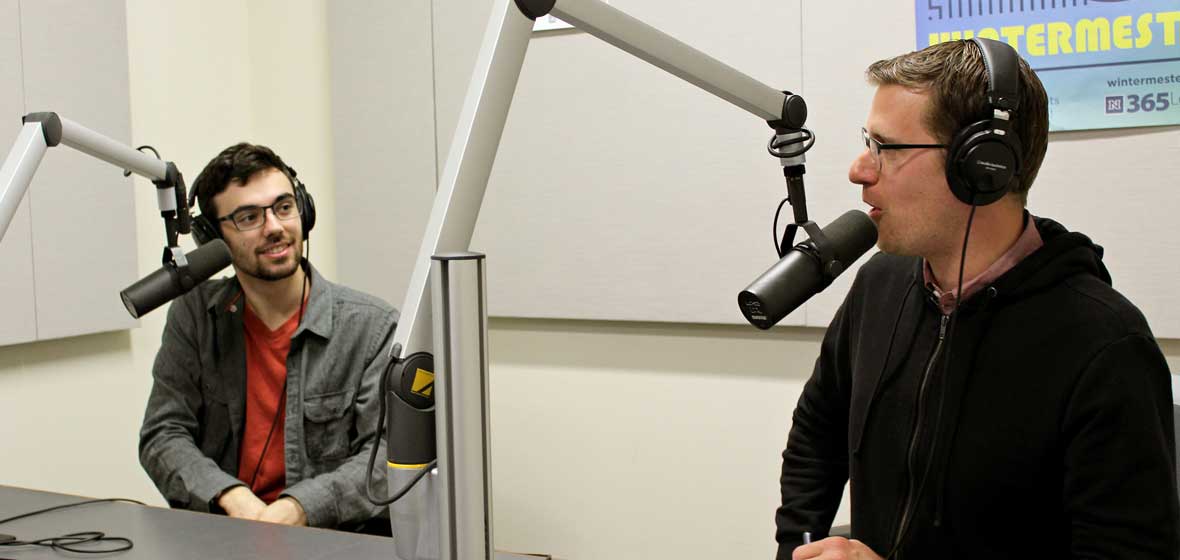“I would say the moment we knew that we should start a podcast, we were in the Reynolds School,” Reynolds School professor Benjamin Birkinbine said. “We got in to this discussion and I got really upset, and I said ‘you have no heart’ and just walked out. So, what do you do? You start a podcast.”
What started as a debate about the cheesiness of the original “The Predator” movie from the 1980s turned in to a weekly podcast. With more than 1,000 subscribers on iTunes, “Residual Culture” covers Birkinbine and Reynolds School student Joey Lovato’s differing taste in forms of media.
The podcast has more than a dozen episodes in which Lovato and Birkinbine exchange lighthearted jabs at each other’s expense while sharing their favorite media examples with listeners.
The name Residual Culture is a term Birkinbine chose that comes from novelist Raymond Williams’s explanation of varying types of culture.
“There’s the dominant culture and that’s what everyone is doing, and we can think about that as pop culture,” Birkinbine said. “There’s emergent culture and that’s the stuff that’s happening now. But then there’s also residual culture and that’s the stuff that is still with us today, and it’s handed down from generation to generation.”
“Residual Culture” covers topics such as popular, cult and underrated movies, stand-up comedy, video games and much more. Both Lovato and Birkinbine give suggestions to each other that reflect their favorite works in these genres or types of media.
Birkinbine said that sharing these recommendations with Lovato is like passing on bits of himself, and when Lovato doesn’t like them, that’s when the mocking will come out– from both sides.
“There’s tremendous value in liking something and then sharing that with another person and trying to find a common ground through media and culture,” he said. “So, when I give recommendations to Joey, those are all recommendations that mean something to me, and if he doesn’t like them, I’ll argue with him.”
In episode three of the podcast, the duo talks about music.
“The beauty about sophistication when it comes to music is that you don’t have to know what you like,” Birkinbine said. “You just have to listen to music and know what you like.”
“That’s true,” Lovato said. “I guess that can be said for any type of media, though, right?”
“Uh, it can,” Birkinbine said. “But that does not protect you from being judged by me and other people.”
“So, if I told you my favorite band was Nickelback…” Lovato said.
“The podcast is over,” Birkinbine said.
Since the student-professor team started in January of this year, Lovato said the podcast has adapted as they debate off-mic. Before every episode, Birkinbine and Lovato brainstorm by sharing their favorite pieces of media and seeing just how much the other doesn’t know about their generation’s media consumption.
“It’s evolved a little bit,” Lovato said. “At first, we thought we should talk about movies, but I think now we want to talk about things that are important on a cultural aspect and are important to modern society. We are trying to preserve that while also discussing the merits of media as a whole.”
And while this environment is unlike a typical job, Lovato views it as one.
“I treat this like a job,” he said. “But whenever we sit down and record, I never leave without a smile on my face. The podcast is not what I expected it to become, but it’s actually way better than that.”
Residual Culture Episode 9, “Underrated Movies,” is one of Lovato and Birkinbine’s favorite. Listen to episode 9 on the “Residual Culture” website.












